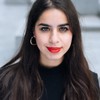Ayman Al Hussein is a 24-year-old Syrian who moved to Turkey to study as a dental prostheses technician in 2012 after the war in Syria began. He’s currently in the process of claiming asylum in the UK as a refugee. Find him on Instagram.
Charlotte: I noticed over the past few years that Muslims were becoming progressively more vilified in the media, as stories about them were almost always revolving around extremism and terrorism. The voices of Muslims themselves were being completely ignored, so I wanted to start a project that offered a platform to challenge the stereotypes that unfortunately a lot of non-Muslims believe.Why do you feel there’s a need for a project like yours?
I think that, until people stop saying "Muslims are…", there will continue to be a need for projects like this. There are almost two billion Muslims in the world, spanning pretty much every culture, so how can anybody speak like they’re one hive mind that all think and act the same way? I also feel like more "controversial" Muslims, like LGBTQ+ and non-hijabis, don’t tend to be offered as much of a platform as others. I want there to be the same opportunities for them to have their voices heard as well.
Kiku Basu is a trans-woman and political and social activist. You can follow her page here.
At first it was really tricky, because apart from my Syrian friend [Ayman Al Hussein], I didn’t actually know any Muslims when I started working on this project. I realised I was probably going to have to deal with a lot of no's and a lot of people challenging me over why I was doing the project, so I just took it on the chin and carried on. I visited an open day at a local mosque and Finsbury Park Mosque on a normal weekday, and again got a lot of no's. It was only after I attended a prayer session at an inclusive mosque in London that I found people. I then started to reach out to people I found on Instagram, in Facebook groups and online and, from there, it began to grow.
Yes, absolutely. I think, sadly, there’s a lot of judgment coming from some Muslims who even go so far as to challenge LGBTQ+ Muslims for even calling themselves Muslims, and so they’re voices that either get silenced or attacked. I wanted there to be a platform for people to say, "I am Muslim and I am gay, and yes those two things can go together," because how can anybody else try to redefine somebody like that and treat total strangers so venomously?
Ferhan Khan is a civil engineer from Glasgow who has been living in London for the last 14 years and believes that the UK is the best place worldwide to be Muslim. He’s openly gay and came out on the BBCs Muslims Like Us, and, despite feeling at odds with his religion when he was younger, has now come to terms with Islam while still believing faith is a personal matter that doesn’t necessarily inform identity.
Definitely. So many people seem to think of Muslims as all being either Arab or South Asian, and forget that there are not only Muslims in countries in Europe, but also in countries all over the world, from Korea to Brazil. Even within one culture, there are all sorts of perspectives. It seems some people need a reminder of it.How powerful do you think photography can be when it comes to dispelling myths of British Muslims?
I think with the way my generation and younger generations find and absorb new information, imagery is absolutely vital to capture people’s attention. You can write and write and write, but without a picture to make people stop scrolling they won’t even get to the point of reading. I think people also need to see that Muslims aren’t all one ethnicity and they don’t all dress and look the same, and this is much easier to portray in a photograph than it is via text.
Ruwaydah is a 24-year-old British-Ghanian, who in July of 2017 married Steven, a 33-year-old Brit born in Newcastle. Ruwaydah was brought up Muslim in London and Steven converted after they began their relationship in 2014.
It’s been received really well so far. At first, there wasn’t really a way for me to let people know I wasn’t Muslim. It only came up when people messaged me, and it really surprised a lot of them. Most were curious to know why I’d started it and were happy that somebody who wasn’t Muslim was noticing the issues they were facing. But one or two had issues with the fact that I was doing this project despite not being Muslim. I got one "how dare you try to reclaim Islam". It's mostly been really positive, though, and I love getting messages from people from all over the world.@its_me_salmaAll photography courtesy of Charlotte Bibby. You can find more of Charlotte's work here.
